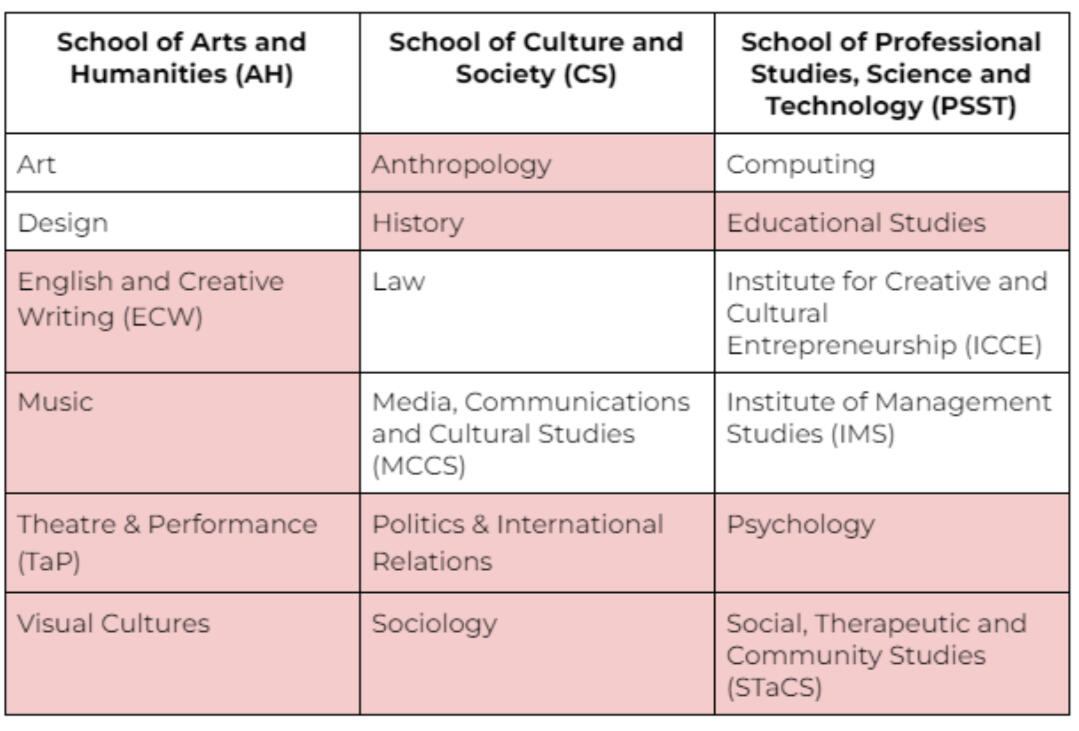- Home
- Introduction
- Redundancies
- Why the TP?
- What's the TP?
- So what?
- How will this impact you?
- Actions & Next Steps
- Contact
Goldsmiths Transformation Programme
Who's next?
Massive College-wide Restructure. 130 Full Time Equivalent compulsory redundancies. Less than 18 months.All you need to know about the latest Goldsmiths restructure, how it affects you, and what you can do.
What’s going on at goldsmiths?
"My lecturers and tutors have been amazing, the teaching has been great and I’m enjoying the course, I hold no ill will towards any of them, they have done their jobs (and beyond) brilliantly. It is the administrative system that has been abysmal."
A massive restructure, just two years after the last one, is currently being put through at Goldsmiths by the Senior Management Team (SMT).Despite legitimate concerns raised by many members of the Goldsmiths community including the SU and campus trade unions UCU and UNISON, the Transformation Programme is set to destroy Goldsmiths as we know it.As we navigate through this period of drastic change, it's evident that these sweeping changes will inevitably influence students, staff and their rights and experience, as similar restructures have done in the past.We recognise responsibility to the Goldsmiths community to ensure that pertinent information about change is not only transparent but also accessible to all.A restructure of this magnitude is bound to have a profound impact, and it's imperative that people are informed rather than having decisions and their impact imposed upon them.
130 fte compulsory redundancies
to what extent?

On 28th February, Senior Management served campus trade unions notice of their intention to make compulsory redundancies equivalent to 130 full time jobs. Given that so many academic staff at Goldsmiths are employed on fractional/part time contracts, it is safe to assume that these redundancies will impact far more than 130 members of staff. Last year’s financial statement shows that Goldsmiths employs 644 academic staff members, and so these redundancies could impact as much as a quarter of all teaching & research staff.Not only this, but SMT have outlined the departments that are ‘in scope’ of these job cuts. They are:

Anthropology
Educational Studies
English and Creative Writing (ECW)
History
Music
Politics & International Relations
Psychology
Social, Therapeutic & Community Studies (STaCS)
Sociology
Theatre & Performance (TaP)
Visual Cultures
Conversations about a restructure began with SMT revealing a severe financial deficit against this year’s forecasted budget.The College has attributed this to a shortfall in student numbers as well as issues affecting the wider Higher Education sector, which Goldsmiths is not immune to. While this is true, it would not be prudent for the College to front this as the main reason for the deficit and its associated ramifications as they have in their student communications sent last term.The depth of the deficit initially stemmed from a shortfall in student enrollment, notably exacerbated by delays in international students receiving offer letters in time to process their visas, leading to significant revenue loss. Despite this, the college initially pointed to covenant terms on loans from Lloyds and NatWest as the basis for implementing extensive cost-saving measures. Student fees had always been the College’s main source of income. The College held that the decline in student numbers raised concerns about meeting covenant terms with the banks, potentially spelling financial and regulatory challenges. When this was raised, the College had engaged in measures to reduce this immediate risk, such as hiring freezes and getting rid of Associate Lecturers. Despite a reduction in the deficit since these discussions commenced, the Senior Management Team (SMT) has kept a financial target of £20 million for this restructuring effort. This prompts questions about the rationale behind the widespread and rapid cost-cutting measures spanning the entire College from the academic structure and ethos to its professional services. The ‘mitigating actions’ outlined in the restructuring plan, initially proposed to address the deficit, are now framed as opportunities for College growth. Yet, there has been limited engagement with demands for necessary changes to enhance the student and staff experience. This poses the question - what kind of Goldsmiths is management trying to 'save'?As a result, the College has developed a wider restructure called "The Transformation Programme" (TP). This comes just two years after the last restructure termed the “Recovery Programme” which saw the Student Centre dissolved and Departmental Professional Services staff dismissed to form three School Hubs, among other changes which have since proven to severely impact student experience.The historical connections and effects between these restructures remain evident today, and the TP will make things worse for students, student experience, and students and staff rights. As can be seen from this article, similarities can be drawn between the narrative framing of the previous restructure with the current one. The narrative of this restructure uses the same frame of 'growth' and response to reduced student numbers as was used for the previous one.The Goldsmiths community has called out the dangers of SMT’s financial-first practices before, and we do so again. It is also unethical for the College to place blame on staff and students, directly or indirectly, instead of taking personal responsibility for the financial problems it is facing. We reject the cash-cow framework that underlines the College's treatment of students, international students, and the instrumentalisation of staff.
background & context
why the transformation programme?
What is the Transformation Programme?
"No redundancies and no cut corners when it comes to student experience! If the management created a deficit in the university's budget, it is NOT the academics' fault nor the students'."
The Transformation Programme is Goldsmiths' latest restructure plan. Its scope is split into different aspects, the main ones being:
Cost-savings - Reducing Goldsmiths' cost base including changes impacting staff and staffing structures for both Academic and Professional Services
Academic Department Restructure - Restructuring Goldsmiths' Academic Departments from 3 schools and 18 departments to 2 faculties and 8 schools, with schools being a possible grouping of ‘subjects’. Departments as they are today will no longer exist.
Portfolio Simplification - Revising Goldsmiths' portfolio of Programmes and Modules to simplify, which could entail module reduction and/or programme closures
Professional Services Transformation - Involves reviewing Goldsmiths' overall operating model and a review of student facing and academic support services to design and deliver changes to processes, academic policies and procedures, and enabling IT systems
Additionally, on Thursday 28 February 2024, senior management served campus trade unions notice of their intention to make compulsory redundancies equivalent to 130 full time jobs. This comes at the same time as the above 4 aspects of the Transformation Programme remains still in development, with no transparency in crucial details such as how exactly the new academic department structure will be implemented, which modules and programmes will be ‘simplified’ or simply cut, and how crucial student rights, services and standards of support provision will be maintained.
so what?
As we have seen before, this shows a repetitive financial-first, hierarchical positioning towards departments and pedagogies which does not align with the Goldsmiths community and, indeed, what Goldsmiths is marketed as.The SU and campus trade unions have consistently called for a holistic assessment of the Transformation Programme and a review of the effects of the previous Recovery Programme.This attitude, which uses a language of ‘high-level’ and ‘strategy’, masks a disregard for the community and experiences on the ground. We remind management and members of Council that in addition to a duty to the institution, you possess a duty to the community.These decisions do not reflect meaningful engagement with the community, nor does it evidence the institution’s commitment to its own mission and values whether in the short or long term.

how will this impact you?
"I love my course and all the modules offered, I would be so gutted to see them discontinue. Me and everyone else have worked so hard to be here and would love the same opportunities ever other pupil had."
students
Impact of Previous Restructure on Students tells all - centralisation has proven to cause severe interconnected issues for students, from delays in processing student requests, appeals and complaints, enrolment, progression and other support severely impacting student experience, finance, and wellbeing
Deteriorating Working Conditions directly impacts student experience, support and satisfaction - stripped resources and power from department staff and students, leaving them overwhelmed and students neglected
Less choice, less voice: the merging of departments and portfolio simplification work poses a huge risk to departmental identity, and the pedagogy that brought you to Goldsmiths, to your programme, to your modules.
academic staff
Far less control over what you teach, and there will be less space for the breadth and specificity of focus across modules that staff and students alike appreciate about Goldsmiths. Management are intent on reaching a target of 20 enrolments per module and programme, which directly threatens small but crucial areas of teaching that should be supported to grow. Deployment of the Connected Curriculum may also pose a risk to the ethos of learning and teaching you and your colleagues have worked hard to create.
Loss of identity and agency: Departments as we know them will cease to exist. Instead, departments will become ‘subjects’ in schools. For those departments that are to be merged into a school with other departments, this will mean less financial autonomy and agency over budgets, which will be controlled at the school level. For the departments that will become a school of their own, this will likely be followed by an expectation to contribute even more income to the college.
The myth of more free time: With potentially more than a quarter of the academic workforce being forced out through voluntary severance and compulsory redundancy, and the potential of more redundancies in Professional Services to follow, this will mean even more work for those staff that remain.
professional services staff
Management intend to make around £1 million in savings from their review of Professional Services (to ‘fix’ all of the problems caused by the last restructure) it is likely that vital administrative teams will be even more under-resourced. Combined with the scope of change from the new faculty structures to the module and portfolio simplifications, impact on students is likely to be unprecedented, therefore workload will increase as well as resources decreasing.
Increased risk of casualisation
Risk of job security to all staff, particularly a risk of redundancies for professional services staff following the Professional Services review

Art by Student, MA Gender, Media and Culture, 2021/22
what can we do?
The Official TP Student Survey - This survey by Goldsmiths SU invites you to share your thoughts on your student experience, expectations and questions or concerns for the College around the Transformation Programme. You will also have the space to share any specific issues you are experiencing, and any actions you want the SU to push the College for. Voice your thoughts and concerns by clicking the button below.
Build on collective demands - The SU has put a set of crucial demands to management, demanding measures be implemented immediately for student support. We want to build on these to capture the experience across the community, particularly for marginalised groups. For students, you can share your thoughts on the SU demands through the TP Survey above, or by reaching out to the SU. Look out for upcoming actions or staff-student meetings, as we bring the community together.
Join an action! We will be organising open student-staff forums to gather feedback and build action and demands. Look out for further details!
this page will be regularly updated with new actions.

Thank You
© 2024. All rights reserved.